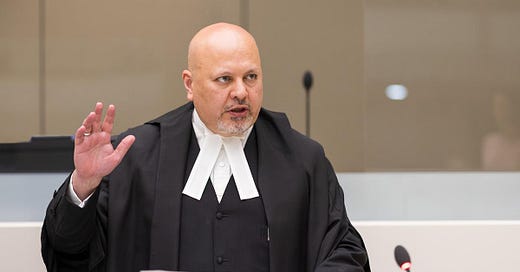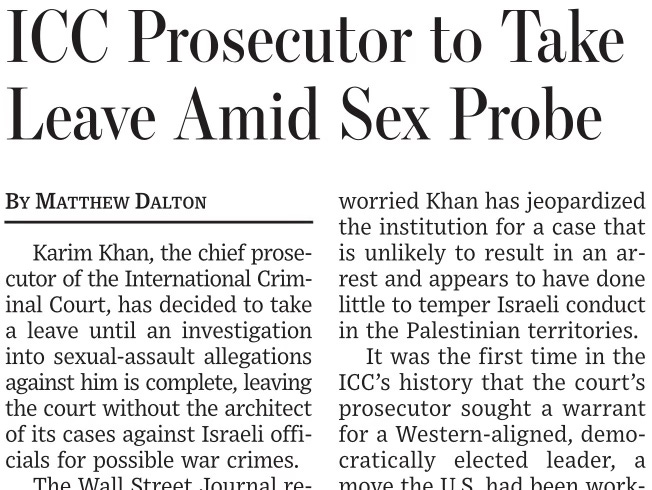ICC prosecutor denies rape
Newspaper links allegations against Karim Khan to request for arrest warrants
The prosecutor of the International Criminal Court (ICC) was questioned by United Nations investigators late last week about allegations of rape, a respected US newspaper reported yesterday.
Lawyers for Karim Khan KC had said it was “categorically untrue that he has engaged in sexual misconduct of any kind”, The Wall Street Journal (WSJ) added.
While not using the term “rape”, the newspaper said Khan, a British lawyer who at one time worked for the Crown Prosecution Service, faced “multiple allegations of coerced sexual intercourse” against an un-named woman. The WSJ’s sources were said to be “documents, her testimony and officials familiar with the allegations”.
Link to arrest warrants?
According to the WSJ, Khan was told by his staff about the woman’s allegations on 2 May last year. The newspaper suggested a link between this and the prosecutor’s announcement on 20 May that he was seeking arrest warrants for the Israeli prime minister Benjamin Netanyahu and his former defence minister Yoav Gallant — as well as three Hamas leaders who are now dead.
The WSJ said:
Just 2½ weeks after Khan learned of the allegations against him last spring, he surprised Israeli and US officials by announcing the most dramatic arrest warrant in the court’s history…
The timing of the announcement has spurred questions about whether Khan was aiming to protect himself from the sexual-assault allegations. The day before announcing the warrant application, Khan abruptly cancelled a trip to Israel and Gaza that he had previously said was important to make his decision.
Khan denied that the prosecutor’s decision on the Israeli warrants had any link to the sexual-assault allegations, according to his lawyers.

My own enquiries have confirmed that senior lawyers working with Khan had been kept in the dark for months. Though concerned to find that that the prosecutor wanted to move so quickly on the most important and sensitive case that the court had ever addressed, they had no idea that he had recently been told of allegations that might threaten his career.
Colleagues questioned Khan’s judgement. They believed that going public would put improper pressure on the court’s pre-trial chamber, which had to decide whether to authorise the arrest warrants. Requests for warrants are often kept secret to avoid alerting suspects.
Retaliation
Although allegations of sexual misconduct can be difficult to prove, the case against Khan is not confined to events that may have taken place behind closed doors.
According to ICC officials cited by the WSJ, “the UN is also investigating whether Khan attempted to intimidate or retaliate against the woman and other officials who reported his alleged misconduct”.
The WSJ, relying on ICC officials, reported that Khan’s alleged victim broke down in tears at work on 29 April last year, telling Thomas Lynch, an American lawyer who was a close adviser at the ICC, that Khan had been sexually abusing her for a number of months and that she couldn’t take it any more. Another colleague was present when Lynch spoke to the woman.
Lynch and two other aides are said by the WSJ to have confronted Khan at his home three days later. “Khan responded that he would have to resign, according to people familiar with the conversation, before adding: ‘But then people will think I’m running away from Palestine.’”
According to the WSJ, Lynch alleges that Khan retaliated against him by moving him to a less important role.
On 3 April this year, Reuters reported allegations that Khan had demoted at least four staff in his office. His UK lawyers denied that he had engaged in retaliatory behaviour but did not comment on claims that UN investigators were examining claims of this nature against him.
The WSJ claimed that Khan tried to persuade his accuser to withdraw her allegations, saying these would undermine his case against Israeli leaders. It said that recorded conversations were now in the hands of UN investigators.
Reports of the WSJ allegations have been picked up by some of today’s UK newspapers.
What next?
It’s not suggested that Khan could face criminal charges under English law because none of the alleged sexual assaults is said to have taken place in the United Kingdom.1
However, as a practising barrister regulated by the Bar Standards Board of England and Wales, Khan is required to comply with the rules and duties in the regulator’s handbook. Core duty 5 tells barristers: “you must not behave in a way which is likely to diminish the trust and confidence which the public places in you or in the profession”. In March, an independent disciplinary tribunal disbarred a senior barrister for inappropriate sexual conduct while in a position of trust.
The ICC prosecutor has a number of privileges and immunities that I discussed last summer. This was in the context of separate complaints that I understand have now been dismissed by the Bar Standards Board.
Investigation
Khan had supported the independent UN investigation after it was announced by the court’s supervisory body last November. In response to questions from the WSJ, Khan said the fact that ICC judges had approved arrest warrants for Israeli leaders on war crimes charges “underscored” his view that the evidence in support of them “met the rigorous legal threshold required” by the court’s rules.
That approval was granted by the court’s pre-trial chamber on 21 November last year. But on 24 April an appeals chamber of five judges ruled that the three-judge pre-trial chamber had made an error of law on the issue of jurisdiction. The appeal judges unanimously reversed the earlier decision and sent the case back to the pre-trial chamber so that it could rule on the substance of Israel’s challenge. A decision is awaited.2
According to the WSJ, Khan was questioned last Thursday and Friday by investigators from the UN’s Office of Internal Oversight Services. It may be some months before their report is submitted to the ICC’s board.
Any action to remove Khan would require the support of at least 63 of the court’s 125 member nations. Unless the assembly of states parties decides that his refusal to step aside is harming the reputation of the court, Khan can remain in post.
In the meantime, further revelations can be expected from insiders who believe that — far from damaging the ICC — speaking to reporters is now the only way to save it.
Update 18 May:
Khan has decided to take leave until the UN investigation is complete, it emerged on Friday evening. The chair of the court’s governing body had urged him to do so after publication of the WSJ’s allegations, the newspaper reported.
“In light of escalating media reports, I have made the considered decision to take leave until the completion of the investigation,” Khan said in an email to staff.
Khan is represented by the UK law firm Carter-Ruck. In a statement reported by Reuters, the solicitors rejected all allegations of wrongdoing against their client. They said Khan had taken leave because media attention on the matter had affected his ability to focus on his work. But he did not intend to resign.
“Our client remains the prosecutor, has not stepped down and has no intention of doing so,” the firm added.
In the meantime, the prosecutor’s office will be run by his two deputies: Mame Mandiaye Niang from Senegal and Nazhat Shameem Khan from Fiji, an overseas bencher of Inner Temple.
Later on 18 May, the presidency of the Assembly of States Parties — the court’s oversight body — expressed confidence that the work of the court would continue “normally and without any interruptions”.
The presidency of the Assembly of States Parties to the Rome statute takes note of the communication of 16 May 2025 by the prosecutor of the International Criminal Court informing of his decision to take leave until the end of the United Nations Office of Internal Oversight Services process. The deputy prosecutors will be in charge of the management of the office of the prosecutor during the prosecutor’s absence.
The presidency of the assembly is confident that the work of the court in the interest of justice — under the leadership of its presidency, the registrar and the deputy prosecutors — continues normally and without any interruptions.
The investigation into alleged misconduct by the prosecutor is conducted by the Office of Internal Oversight Services upon request by the presidency of the assembly, after having consulted the bureau of the assembly. The investigation is pursued in order to ensure a full independent, impartial and fair process, in conformity with the legal framework of the ICC and due respect for the rights of all parties involved.
The Office of Internal Oversight Services will report to the president of the assembly upon completion of the investigation. The findings of the investigation will be handled in a transparent manner in accordance with the Rome statute and the legal framework of the court.
The presidency of the assembly continues to call for due respect of the privacy and the rights of all involved parties as well as the integrity of the investigation.
The Assembly of States Parties is described as the ICC’s management oversight and legislative body. Its members represent states that have ratified or acceded to the Rome statute. The term “presidency” refers to the assembly’s president — Päivi Kaukoranta from Finland — and two vice-presidents: Michael Imran Kanu from Sierra Leone and Margareta Kassangana from Poland.
Update 19 May: the deputy prosecutors have confirmed that they have taken over. They “underline the importance of ensuring continuity of the office’s activities across all areas of work”.
Update 8 June: a well-informed report by Chloe Hadjimatheou appears in the Observer today.
This piece remains closed for comments.
A reader has alerted me to section 73 of the Sexual Offences Act 2003, as amended in 2008, which provides extra-territorial jurisdiction for sexual offences committed abroad by UK nationals. But schedule 2 makes it clear that these offences cannot be charged if the alleged victim is 18 or over, as she is in this case.
Update: on 9 May, Israel asked the pre-trial chamber to withdraw the arrest warrants for Netanyahu and Gallant. It argued that the prosecutor should suspend its investigation until the court has given its substantive ruling on Israel’s challenge to the court’s jurisdiction. That followed Khan’s request on 5 May for the court to set deadlines.





